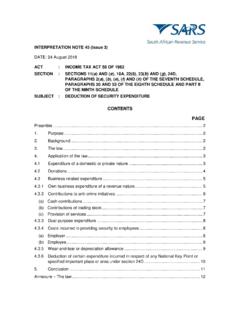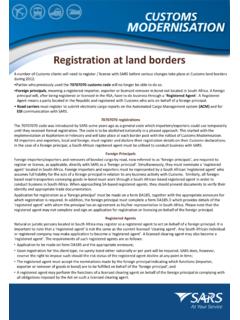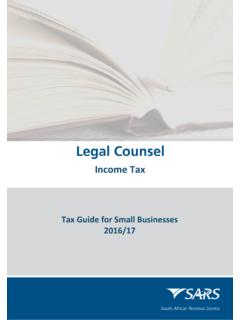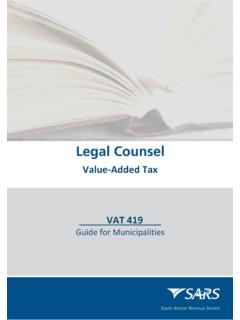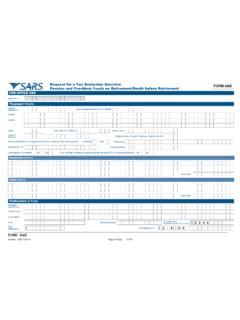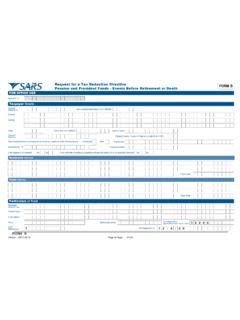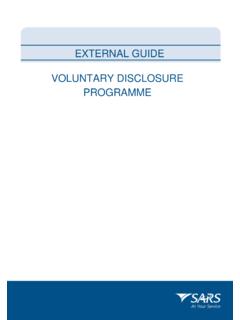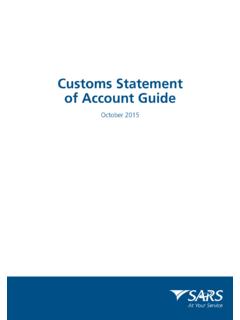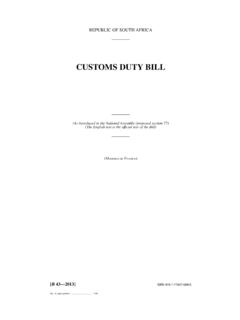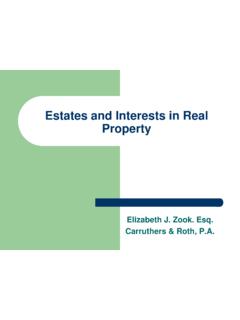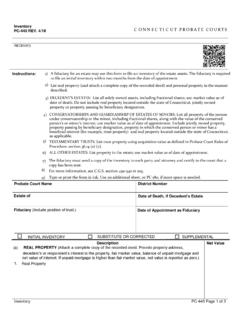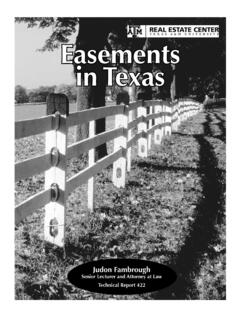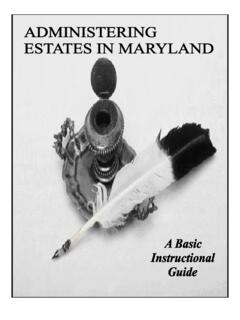Transcription of Deceased Estates - South African Revenue Service
1 Frequently Asked Questions Deceased Estates Income Tax and estate Duty FAQs: Deceased Estates The Frequently Asked Questions (FAQs) in this document have been compiled on the basis of questions that executors and the public at large have about the tax treatment of Deceased Estates . The FAQs are drafted purely to assist executors and the public at large to obtain clarity and to ensure consistency on certain practical and technical aspects relating to estate duty and the income that may arise after the date of death. The FAQs are therefore not intended to be used as legal reference. More information about some of the aspects discussed in this document are available in the Guide to the Individual Income Tax Return for Deceased and Insolvent Estates External Guide and the Comprehensive Guide to Capital Gains Tax (Issue 8).
2 The FAQs are also intended to solicit further questions regarding the practical aspects and tax treatment of Deceased Estates . The FAQs will therefore be updated periodically to address these questions, as well as any changes to the legislation. In light hereof, it is not envisaged that non-binding private opinions in relation to the amendment will be issued. Any questions that have not been addressed in the FAQs can be emailed to the estate Duty Mailbox for consideration. All other forms, guides and interpretation notes referred to in these FAQs are available on the SARS website. Unless indicated otherwise, the latest issues of these documents should be consulted. Leveraged Legal Products South African Revenue Service .
3 6 August 2020. 1. FAQs: Deceased Estates Question Answer General estate duty 1. What is estate duty? estate duty is the duty levied under the estate Duty Act, 1955 (the ED Act) on the dutiable amount of an estate of a Deceased person. 2. What is the estate duty The duty is levied on the dutiable amount of an estate that does rate? not exceed R30 million at a rate of 20%. estate duty is levied at a rate of 25% on the dutiable amount of an estate that exceeds R30 million. estate duty calculation 3. How is estate duty The following table illustrates how estate duty is calculated: calculated? R. Value of property [section 3(2)] xx Plus the value of deemed property [section 3(3)] xx GROSS VALUE OF THE estate XXX.
4 Less allowable deductions/expenses (section 4) (xx). NET VALUE OF THE estate XXX. Less section 4A rebate (xx). DUTIABLE AMOUNT OF THE estate XXX. estate duty @ 20% on value of property not X. exceeding R30 million estate duty @ 25% on value of property exceeding X. R30 million 4. What is included in an The estate of any person shall consist of all the property and estate ? deemed property (situated in and outside South Africa) of the Deceased person as at the date of death. However, for a Deceased person who was not ordinarily resident in South Africa, any property situated outside South Africa will be excluded. 5. What is the meaning of property is defined in section 3(2) of the ED Act to mean any property ?
5 Right in or to property , movable or immovable, corporeal or incorporeal. The definition is comprehensive and includes real rights such as the rights attached to fixed or moveable property as well as personal rights (for example, any fiduciary, usufructuary or like interest in property and any right to an annuity (other than a right to an annuity charged on property )). Section 3(2)(bA) of the ED Act specifically includes any contributions made by the Deceased person to an approved South African retirement fund that was allowed as a deduction under section 5 of the Second Schedule to the Income Tax Act, 1962, in determining the lump sum benefit payable to the Deceased person. 2. FAQs: Deceased Estates Section 3(3) of the ED Act further includes certain property as deemed property in the estate .
6 The following property is regarded as deemed property : Domestic policies on the life of the Deceased , subject to exclusions. Exempt donations under section 56(1)(c) or (d) of the Income Tax Act. An accrual claim on behalf of the Deceased person against the surviving spouse under the Matrimonial property Act, 1984. Any property that the Deceased was before his or her death competent to dispose of for his or her own benefit or for the benefit of his or her estate . 6. What property is excluded A distinction should be made between a person who is ordinarily from an estate ? resident at the time of death and a person who is not. Ordinarily resident: Section 4(e) of the ED Act provides that property acquired before becoming ordinarily resident in South Africa may under certain circumstances be excluded from the estate .
7 If the Deceased is ordinarily resident in South Africa at the date of death, his/her property in South Africa as well as his/her property situated outside South Africa, subject to certain exclusions, is taxable. Not ordinarily resident: property situated outside South Africa as provided for in section 3(2)(c) (h) of the ED Act is excluded from the Deceased estate in South Africa. If the Deceased person was ordinarily resident outside South Africa at the time of death, but had assets in South Africa, the Deceased person will have a South African estate for estate duty purposes. Furthermore, section 3(2)(i) of the ED Act excludes any benefit payable to the Deceased from an approved retirement fund as a result of death.
8 7. Are there any exemptions No. The ED Act does not provide for any exemptions, but only for from estate duty? the exclusion of certain property from an estate (see Question 6). 8. What impact can the The matrimonial property regime under which the Deceased matrimonial property person was married will impact the calculation of estate duty. In a regime have on the estate marriage out of community of property , each spouse has his or duty calculation of the her own estate . Where the accrual system applies to a marriage Deceased ? out of community of property , the spouse with the smallest accrual will have a claim against the other spouse. If the Deceased person has the larger estate , a claim will be made against the Deceased estate by the surviving spouse [section 4(lA)].
9 If the Deceased person has the smaller estate , the estate have an accrual claim against the surviving spouse and it will be included in the Deceased estate as an asset [section 3(3)(cA)]. 3. FAQs: Deceased Estates In a marriage in community of property , a joint estate exists. When one spouse dies, the entire estate must be administered, but the surviving spouse has a 50% interest in the joint estate and may claim his or her half share. Additional claims may arise under the law of intestate succession. The value of the surviving spouse's estate is calculated after liabilities and administration costs have been deducted from the joint estate . The funeral costs and estate duty are paid from the Deceased 's half of the estate alone.
10 The latter two deductions are only made after the joint estate had been divided. Although the whole amount of funeral costs is taken into consideration for administration of the joint estate , that amount is added back to establish the one-half share of the joint estate belonging to the surviving spouse and which is not subject to estate duty. The whole amount of funeral costs is then subtracted from the Deceased 's one-half share of the joint estate . 9. What deductions are The following list of expenses are available to qualify as available to reduce the deductions against the gross value of the estate to determine the value of an estate ? net value: Section 4(a): Funeral, tombstone and deathbed expenses.
